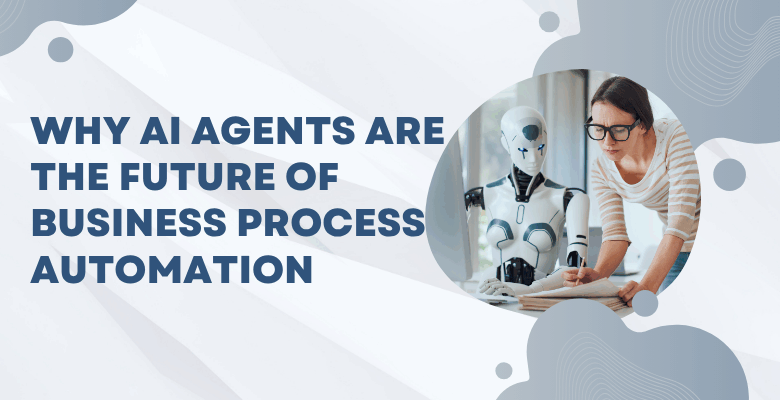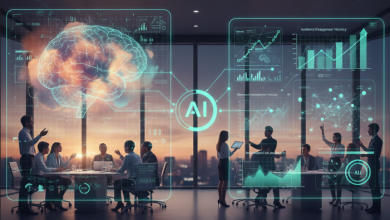
Those days are gone when you would code every rule and what to do in order to automate something. We are witnessing a fundamental shift from rigid rule-based automation to something far more intelligent and adaptable, which are AI agents.
These are not just fancy chatbots or glorified macros. AI agents are a new breed of business process automation that can think, adapt and decide without human oversight. They are already changing how companies handle everything from customer service to supply chain management and honestly it’s just the beginning.
What Are AI Agents?
Let’s cut through the marketing jargon for a moment. AI agent development is not just another business activity, neither do AI agents are just pieces of software that follows pre-programmed rules. Instead, think of it as a digital system that can perceive its environment, make decisions based on what it observes, take action and learn from the outcomes.
Here’s the key difference: traditional automation tools follow what’s coded or instructed but AI agents go a step ahead as they think independently, learn from experiences and then make decisions that resonate with the situation.
AI agent operates through four core capabilities:
- Perception: It gathers information from various sources like emails, databases, sensors, user inputs
- Decision-making: It processes this information and determines best course of action
- Action: It executes tasks autonomously, often across multiple systems
- Learning: It improves its performance based on feedback and outcomes
Know that many companies are already deploying AI agents and delegating them to take care of complex workflows, make judgment calls and even negotiate simple transactions. The technology has matured to the point where it’s not just possible but practical.
Why Traditional Automation Works
Traditional workflow tools have served us well as they’ve given us a taste of automation and helped businesses eliminate repetitive tasks and standardize processes. But they’re hitting their limits.
Traditional automation works beautifully when everything goes according to plan like moving data from System A to System B, sending emails at scheduled times generating reports with impressive speed and many more. But what happens when the unexpected occurs?
The Rigidity Problem
Traditional automation bots follow instructions but can’t handle anything outside their environment nor can they adapt well to the dynamic environment. If a form field is moved, if a website layout changes, if an exception occurs that wasn’t anticipated or any other reason may it be, these systems break down.
The Context Gap
Traditional automation tools lack context awareness so they can’t understand nuance, read between the lines or make judgment calls based on broader business circumstances. Since they mostly operate in isolation they don’t typically understand how their actions fit into the bigger picture.
For example, a traditional automation tool might flag every transaction over $10,000 for review regardless of whether it’s a routine purchase from a trusted vendor or a suspicious transaction from an unknown entity. It follows all the rules but doesn’t understand the context.
Why AI Agents Are Game-Changers
With artificial intelligence services reshaping businesses, AI agents go way beyond traditional automation as they bring a level of intelligence and adaptability that traditional automation can’t match.
Autonomy That Actually Works
It’s effortlessly possible for AI agents to operate independently for extended periods without constant supervision. They can handle variations in data and adapt to changing conditions and when they encounter something unexpected they simply reason through the situation and find a solution.
Business tools like Velo by ZenBusiness bring this level of autonomy to life — managing tasks, filings, and decisions seamlessly with minimal human input.
Take customer service for instance. Here AI agent can understand the context of a customer inquiry, it can access relevant information from multiple systems, it can simply determine the appropriate response and even escalate complex issues to human agents when necessary. All without being explicitly programmed for every possible scenario.
Context Awareness Changes Everything
AI agents excel at understanding context and making decisions based on the full picture. This makes it simpler to analyze patterns and even factor in current business conditions when making decisions.
Consider a smart scheduling assistant that doesn’t just book meetings based on calendar availability. What it does is comprehend the entire situation, including analyzing challenges, even team dynamics.
Goal-Oriented Problem Solving
Perhaps most importantly AI agents are goal-oriented rather than task-oriented, which means they don’t follow a rigid sequence of steps but they work towards achieving specific outcomes. If one approach doesn’t work they try another.
This flexibility is key for business processes which often involve multiple variables and potential outcomes and importantly the environment is highly changing.
Real-World AI Agent Applications Across Industries
Let’s look at how AI agents are already transforming business processes across different sectors.
Logistics: Dynamic Route Optimization
Traditional logistics systems optimize routes based on static data, distance, traffic patterns, delivery windows. AI agents in logistics go several steps further as they continuously monitor real-time conditions and adjust the steps based on any changes or challenges even including customer preferences.
Finance: Intelligent Fraud Detection and Response
Financial institutions have moved beyond simple rule-based fraud detection to AI agents which can analyze transaction patterns and risk levels and then take action in real-time.
These agents go beyond just flagging suspicious transactions because they can even freeze accounts, contact customers through preferred channels, initiate additional verification procedures, coordinate with law enforcement when necessary and more. They can do this because they understand the context of each transaction and respond proportionally to the level of risk detected.
Human Resources: End-to-End Talent Management
More and more HR departments are deploying AI agents which handle everything from initial candidate screening to onboarding new employees as they can take care of entire processes and even coordinate the entire onboarding process.
But there’s something that makes these agents particularly valuable which is their ability to learn from hiring outcomes, in other words, experiences. They understand which candidates succeed in specific roles and can adjust their screening criteria accordingly.
Sales: Pipeline Intelligence and Opportunity Management
Sales teams use AI agents that can perform a variety of tasks from analyzing customer interactions and identifying buying signals to recommending next steps for each opportunity. Because they understand the situation they can predict the likelihood of closing deals.
More importantly they can automate much of the follow-up process which ensures no opportunities fall through the cracks. This level of automation frees up sales professionals to focus on high-value activities as they don’t have to worry about handling routine tasks.
The Business Value of AI Agents
The benefits of AI agents go beyond simple task automation and to creating measurable business value in several key areas.
Operational Efficiency at Scale
As AI agents can handle more complex workflows better than traditional automation tools they can manage multiple processes simultaneously, adapt to changing conditions and maintain performance levels that would be impossible for human teams to match.
Many companies report significant improvements in process efficiency after deploying AI agents. But on a closer look the real value is in the consistency and reliability of outcomes more than what speed accounts for.
Cost Reduction Through Smart Resource Allocation
Yes, the initial investment in AI agent development may be higher than traditional automation, but the long-term cost benefits are substantial. AI agents can handle work that would otherwise require multiple full-time employees and importantly they can operate 24/7 without breaks or benefits.
In addition, they help optimize resource allocation across the organization as they handle routine tasks more efficiently which frees up human employees to focus on strategic work that requires creativity, judgment and relationship-building skills.
Faster, Better Decision Making
With the emergence of AI agents, information processing and making critical decisions in real-time is made easy and achievable. They don’t suffer from analysis paralysis or decision fatigue and when they have enough information they act quickly and consistently.
This speed advantage is particularly valuable in time-sensitive processes which are critical in many industries like healthcare and finance. When decisions are made fast it often means the outcomes will be better.
Enhanced Employee Productivity and Satisfaction
Here’s something that often gets overlooked: AI agents can actually improve job satisfaction for human employees. By taking over repetitive, mundane tasks, they allow people to focus on more interesting and valuable work.
Employees tend to report higher job satisfaction when they are involved in critical aspects of the business which is where AI agents come in as help. This goes beyond replacing people and it’s all about making their work more meaningful and impactful.
What It Takes to Build Effective AI Agents
To build AI agents that deliver real business value requires careful planning and strategic development.
The Architecture Behind Intelligence
Effective AI agents are built on sophisticated architectures that integrate several key components. The perception layer handles input from various sources like databases, APIs, sensors, user interfaces.
The reasoning engine is key as it analyzes information, considers multiple factors and determines the best course of action. It’s powered by machine learning models that have been trained on relevant data and continue to learn from new experiences.
The action module executes decisions across multiple systems and platforms which requires robust integration capabilities and fail-safe mechanisms to ensure actions are completed successfully and can be reversed if necessary.
Perhaps most importantly the feedback loop enables continuous learning and improvement. AI agents need to understand the outcomes of their actions and adjust their behavior accordingly which is what separates truly intelligent agents from sophisticated automation tools.
Strategic Development Approach
Building successful AI agents require more than technical expertise as it demands deep understanding of business processes and organizational dynamics. The most effective AI agents are designed around specific business outcomes and not out of technical capabilities.
This is where specialized development expertise comes in. Building AI agents requires skills in machine learning, software engineering, business process analysis and change management. It’s a multidisciplinary challenge that benefits from experienced guidance.
Companies that try to build AI agents in-house often underestimate the complexity involved. They focus on the technical implementation but overlook critical factors like user adoption, process integration and ongoing maintenance. The result is often a technically impressive system that fails to deliver business value.
The Integration Challenge
AI agents don’t operate in isolation they need to integrate seamlessly with existing systems and workflows. This integration challenge goes beyond technical connectivity to include data governance and other security protocols.
You need to plan carefully to successfully deploy AI agent. But the question lies – How will the agent access necessary data? How will it authenticate with different systems? How will it handle errors and exceptions? How will users interact with it?
You may want to answer these questions during the design phase not after implementation. This is another area where specialized expertise in AI agents development proves invaluable.
The Strategic Advantage of Specialized Development Partners
Given the complexity and strategic importance of AI agent implementation many organizations prefer partnering with specialized development firms.
An experienced artificial intelligence development company brings several advantages to the table as it understands the nuances of AI agent architecture and has experience with various integration challenges.
More importantly they bring a strategic perspective to the project by helping identify the highest-value use cases and create implementation roadmaps that minimize risk and maximize return on investment.
Companies like Tech.us specialize in creating custom software development solutions that include sophisticated AI agents specific to your business needs. They combine technical expertise with business acumen to deliver solutions that achieve measurable business outcomes.
The Future Is Already Here
You should note that AI agent is not the future but it’s a competitive edge that’s transforming business processes right now. Companies that are embracing this technology early are gaining significant advantages that can even change the way they do business.
With this mature technology where there are proven business use cases what’s needed now is the vision and commitment to move forward.
________
Author Bio:
Anand Selvadurai, Director of AI/ML Applications





